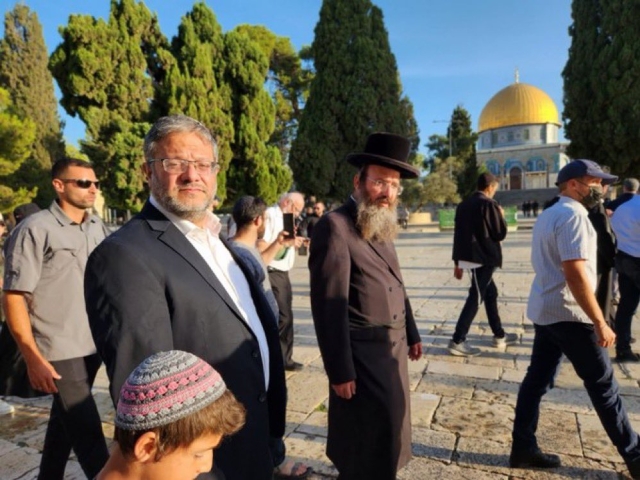Israeli Minister of National Security, Itamar Ben Gvir, made a notable visit to the Temple Mount on Thursday morning to mark the Tisha B'Av fast, a day that commemorates the destruction of the Temple in Jerusalem. Despite security tensions and ongoing protests against the Netanyahu-led government, Ben Gvir considered it vital to assert Israel's connection to the sacred site. Prior to his visit, he informed Prime Minister Benjamin Netanyahu of his intentions. Minister of the Negev and Galilee Yitzhak Waserlauf, and Knesset member Amit Halevi from the Likud party also later ascended the mountaintop.
Ben Gvir emphasized the significance of unity among the people of Israel, stating, "On this day, in this place, it is always important to remember - we are all brothers. Right, left, religious, secular. We are all the same people. And when a terrorist looks through the window, he does not differentiate between us. Unity is important, love of Israel is important." Minister Vassalrauf shared the sentiment, expressing his hope for the building of the Temple.
Ben Gvir visits the Temple Mount this morning to mark Tisha B’Av. The day on the Jewish calendar that marks the destruction of the first and second temples- the sites on which Al Aqsa mosque is built. pic.twitter.com/WOBY23mN4F
— Lidar Gravé-Lazi (@LidarGL) July 27, 2023
Apart from Ben Gvir, over a thousand other Jews also ascended the Temple Mount on Tisha B'Av. However, three of them were detained by the police after bowing down at the site. Ben Gvir's previous visits to the Temple Mount in January and May had sparked anger in the Arab world and drew condemnation from the United States.
Palestinian terrorist organizations have seized on these Jewish visits to the Temple Mount, using them as propaganda tools to portray it as a form of desecration. A Hamas spokesperson accused Ben Gvir of leading a group that stormed al-Aqsa and engaged in provocative religious ceremonies, songs, and chants, including prostrating themselves on the ground during the visit. The Popular Front for the Liberation of Palestine also issued a statement calling the situation an aggressive attack against Jerusalem's holy places, calling for resistance and urging people to defend the Al-Aqsa Mosque on Friday.
Ben Gvir urges 'unity' during Tisha B'Av Temple Mount visit
— i24NEWS English (@i24NEWS_EN) July 27, 2023
'This visit on Tisha B'Av might be received differently among Jews, because this is the anniversary of the Temple's destruction. And obviously it echoes with the current divisions in Israel' says @owenalterman #i24NEWS pic.twitter.com/cPcsnW3jT5
The Temple Mount remains a deeply sensitive and contested site, with religious and political implications for both Israelis and Palestinians. While Jewish visits to the site are permitted, they often trigger tensions and protests among Palestinians and other Arab nations who consider the area to be part of the Al-Aqsa Mosque complex, one of Islam's holiest sites. The situation underscores the complexities and challenges surrounding the delicate balance between freedom of religious expression and the broader Israeli-Palestinian conflict.


